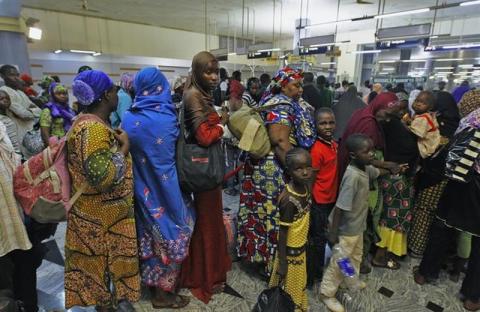Advertisement
Mali, Niger Evacuate Citizens From Central African Republic
BANGUI (Reuters) - African countries have started evacuating their citizens from the Central African Republic in recent days amid deteriorating humanitarian conditions and inter-religious violence.
A Muslim group, the Seleka, set off a wave of killing and looting in the majority Christian nation after seizing power in March, prompting reprisal attacks from militias.
The clashes have killed more than 1,000 since December and the United Nations says 935,000 have been driven from their homes. Aid workers are struggling to provide medical care and adequate food and water for more than 100,000 people who are at the main makeshift camp for those who have fled their homes, situated at the airport outside the capital Bangui.
Mali's government has chartered two flights to evacuate around 500 of its citizens on Sunday while 150 of Niger's citizens arrived back in the capital Niamey on Friday night.
"I can't say whether there were incidents of aggression against Malians, but most countries have now decided as a precaution to bring home their citizens," said Mali government spokesman Mahamane Baby.
Chad has already repatriated around 12,000 of its citizens in recent days by emergency flights and land convoys, many more than other countries because Chad citizens have been targeted by Christians who accuse Chadian forces of supporting the Seleka rebels. Chad strongly denies this.
Senegal brought back more than 200 citizens this week.
The deployment of 1,600 French and nearly 4,000 African peacekeepers has failed to stop the killings in the Central African Republic.
A poll on Saturday showed French public support for its military intervention there is rapidly waning with only 41 percent supporting the operation.
The African country has a history of weak governance. Since independence from France in 1960, it has seen five coups and numerous rebellions.
A Reuters reporter in Bangui said that sporadic gunfire was heard early on Saturday in a northern neighbourhood of the capital, in an area hit by shells and mortars earlier this week. It was not immediately clear if there had been injuries or fatalities.
Central African Republic's interim government, in a broadcast on Saturday apparently at odds with the daily life in the capital, called for citizens to return to work.
"The country has fallen and the national economy is at the bottom of an abyss - and that's why civil servants should go back to work as early as 6 January to boost the country," said the minister of public works, Gaston Makozangba, in a message played on repeat on state radio.
Food costs have soared in Bangui and the Reuters reporter said the cost of rice had doubled to 1,000 Central African CFA Francsper kilogramme in just over a month.



















Add new comment